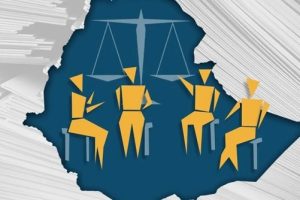
In one form or another, the confrontation between East and West is escalating to an alarming scale, if not to where it has been during the Cold War. Some analysts went as far as warning about the possibility of sparking yet another world war. Like in the days of the heights of confrontation of communism and capitalism, Africa has become a battleground between East and West.
But unlike in the past, the majority of the present generations of African leaders choose not to fall for either side. They choose to play the middle ground. They have realized what Africa needs. They have a road map now that guides them the future where Africa is united, peaceful and prosperous. Most of all, they began to speak their mind publicly to the face of the world powers.
That was what we heard last week at the Russia-Africa summit held in St. Petersburg. The Ethiopian premier, the presidents of Uganda and South Africa, as well as the chairs of AU and AUC, voiced Africa’s concerns, hopes, and needs in the global arena that grabbed the attention of the entire world. The collective message of these African leaders to the world is Africa should be considered as a force to be reckoned with, and a power to be listened to as equal development and peace partner.
The burning issue in the back of the African leaders, when they flew to St Petersburg, was the increasing effect of the Russia Ukraine conflict on the millions of African population. The African leaders are concerned about the continuation of this conflict so much so that they even took the initiative to draw a peace proposal to end the conflict, and presented it to the warring sides a month ago.
That is just a ground breaking experience for Africa. In previous times it was the Europeans who mediate peaceful resolution of conflict between Africans. Now Africans have offered a peace plan to settle the conflict between Russia and Ukraine. Interstingly enough, the Russian presidents have promised to give due consideration to the African peace initiative.
“This war must end. It can only end on the basis of justice and reason. The disruption it is causing in the energy and grain supplies must end immediately. The agreement on grain [the Black Sea grain initiative] must be extended for the benefit of all the people in the world and Africans in particular.” said Faki of the African Union.
The African leaders have made it clear that African nations have their shared visions and agendas, and seek a partnership of equals, and are not focusing on the lookout for food handouts. “African countries are shaping their own destiny as nation states and as a continent. Respect
and mutual benefit should underpin what we, as Africa, do as we relate to other countries in the world…We are saying the Black Sea should be opened to the world market. We are not here to plead for the African continent.” said South Africa’s Ramaposa.
Uganda’s Musseveni, whose wise words never cease to amaze us told the Russians that Africans systematically were made to remain raw material suppliers and that the money they made from their natural resources is minimal compared to what their foreign trade partners get .He underscored that Africa’s resources must be harnessed primarly for Africa’s benefit, and its economic transformation.
Musseveni urged foreign powers to consider working with Africa to develop manufacturing capabilities to add value to its resources before being exported to ensure economic transformation.
Economic experts assert that the majority of African resources were being exported without significant value addition. This practice has caused Africa to fail to fully benefit from the bounty of its resources. The question here is would world powers willingly help Africa to fully utilize its potential?
“This is part of modern slavery. Africa is being locked into and also locking itself into only producing raw materials of agriculture and minerals etc., and abstaining from adding value. A kilogram of good coffee hands is about 2.5 US dollars. The same kilo gram roasted and processed outside Africa hands about 40 US dollars. This is the hemorrhage that stunted Africa’s growth.” said Musseveni.
The Eastern bloc powers like China and Russia have helped Africa a lot to develop manufacturing capabilities and infrastructures. Musseveni’s words remind us of the contributions the Soviets/ Russians and countries in the eastern block made to enhance the development of manufacturing sectors in Ethiopia.
It was the GDR, East Germany, which built what was presumed to be the first large-scale heavy industry in Ethiopia, the Mugher Cement Industry. In Batu, a town about 160 km southeast of Addis Ababa, there is a huge chemical factory that houses a complex plant that produces a chemical called caustic soda, which in turn is used as an input to a wide range of industries in the country including textile, beverage, paper, detergent, and food industries.
The huge chemical plan, designed and constructed by a Ukrainian scientific firm under the former Soviet Union, is typical in that the raw material it used to produce caustic soda were minerals available locally in the nearby areas.
Russian/soviets played a crucial role during the era of socialist Ethiopia in the development of extractive industries, the energy sector, and human resource development. Now after a haitius of over three decades, Russians are determined to rekindle the Soviet legacy of economic cooperation with Ethiopia. The speaker of the parliament of the Russian Federation recently stated “We have prospects for long-term cooperation in such fields as mining, energy, transport, construction, and agriculture.”
During last week’s summit, African countries signed various trade and investment deals focusing on several sectors of the economy from agriculture to nuclear technology. Ethiopia for instance has secured deals with Russians in areas including customs service cooperation, cyber security, establishment of biological science research center, air transport cooperation, as well as nuclear energy development for civilian purposes.
Undoubtedly the summit held in St.petersburg, which is the second of its kind, preceded by the one held back in Sochi about four years ago, has also helped Russia to realize that it still has a vast opportunity and role to play in expediting the socio-economic development of Africa.
The Africans have told the Russians that they have a clear advantage as a trusted and reliable development partner, due to the positive history of Afro-Russian relations, not marred by the horrors of slavery and colonialism. So, it is up to the Russians to uplift the relatively low volume of civilian trade and investment in Africa before it is too late, at least to the point where it had been in the Soviet era. From the summit at Petersburg, Russia has also learned it is not alone, and that Africa needs to be a priority worth taking and with much more dividends.
BY SOLOMON WASSIHUN
THE ETHIOPIAN HERALD SUNDAY EDITION 6 AUGUST 2023



